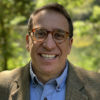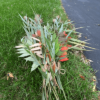by Rebecca Levy Dear Friends, Since the summer, we have had the incredible fortune of having six wonderful interns supporting and enriching our work. Much gratitude to Repair the World Serve the Moment, the Applebaum Internship Program, JOIN, and the Hornstein Program For Jewish Professional Leadership at Brandeis University. One of these interns, Rebecca Levy, has written the piece below and we are thrilled to be able to share her words with you. In loving community, Wren, Rabbi Nate, Marla, and Hannah When sitting in shul, my favorite part of most sermons is the speaker’s call to action, which typically comes towards the end. Yes, it is important to learn and the lessons that we draw from the Torah and from life are beneficial, but as one of my English-teachers always said, “so what – who cares?” – English-teacher code for “why is this important and what can we take away from it?” Especially in days like these, when the feeling of loss and uncertainty can be overwhelming, I like to know what I can do moving forward. Do not get me wrong, I love to learn and learning is necessary if you want to act meaningfully, but […]


















